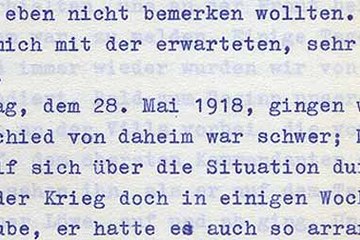The Leipzig Trials (1921-1927). Between national disgrace and juridical farce
The extent of violence and destruction in the First World War was horrifying for all participants. Military norms were also transgressed in a dimension never seen before. As the Allies shifted the main portion of guilt to the German Empire, this nation – long an object of suspicion with its militarism for the victors of the war – was to be made an example of.
The provisions of the Treaty of Versailles (1919/20) included the demand that Germany had to deliver its suspected war criminals to the Allies. Regardless of the offence the accused were to be tried before a national or international criminal court. This demand was considered something completely new; after all, a given feature of peace treaties up to 1914 had been that all participants in the war be granted an amnesty. The gigantic dimensions of the First World War were to put an end to this practice. In the opinion of historian of law Gerd Hankel: "The penalisation requirements of the Allies […] despite all the indignant rhetoric, were not merely staged […], they were rather the expression of a deep-seated conviction that after this war […] it could not simply be business as usual."
The German public reacted indignantly to the extradition provisions of the Treaty of Versailles, which was in any case perceived as a ‘humiliating dictated peace’. The list of around 900 persons to be extradited – including simple soldiers, generals and high-ranking politicians – was seen on the German side as massive interference in national sovereignty and passionately rejected.
The German protest was soon followed by concern on the part of the Allies, who saw the danger of a political destabilisation of Germany in forced extraditions of this kind. As Germany for its part embarked on specific measures to bring the accused to justice, the Allies initially waived their extradition in February 1920.
In order to gauge the sentencing practice of the German judiciary, the Allies drew up a so-called ‘test list’ of 45 suspected war criminals. The Allies worked on the assumption that there was sufficient proof in these cases for the defendants to be sentenced unconditionally.
Verdicts on the trials held from early 1921 were consistently negative, both on the part of the domestic and foreign public. While they were perceived as a national disgrace in Germany, abroad they were considered a legal farce. Moreover, the German judiciary had to grapple for the first time with such terms as ‘acting according to orders’, a ‘necessity of war’ and their new definition of ‘war crimes’. The German legal conception of ‘war crimes’ up to that point defined them primarily as an offence in which German soldiers were set against the German state. That now German soldiers were put before a German court because they had committed crimes in the war for Germany was something new. The fact that one did not always act towards war opponents in the spirit of the ‘valid moral law’ had been considered pardonable conduct up to that point. While the German Empire signed the Hague Land War Convention of 1907, nonetheless, as asserted by historian Alan Kramer, "[…] the army leadership made no secret of the fact even in the pre-war period of its contempt for the 'sentimentality and mushy rapture of feelings’, i.e. for the codification of humanity in war."
The Allies showed themselves indignant at this. Belgium and France cancelled the collaboration with the Leipzig Imperial Court, insisting on the extradition of the accused. As at this time this was not achievable in terms of hard politics, both countries began to hold trials in absentia. Germany’s reaction to this was to continue itself those trials begun abroad. Yet the intended goal was different: the German Ministry of Justice issued the instruction to the Imperial Attorneys to end all trials in Germany that had begun in France and Germany with suspended sentences. In this way some 1,700 cases up to 1927 were deferred by the Leipzig Imperial Court.
Thus the legal pursuit failed, at least initially. Initially, because the experiences that the Allies went through with the German judiciary were to be a shaping factor in the organisation of the Nuremberg Trials following the Second World War.
Hankel, Gerd: Die Leipziger Prozesse. Deutsche Kriegsverbrechen und ihre strafrechtliche Verfolgung nach dem Ersten Weltkrieg, Hamburg 2003
Kramer, Alan: Deutsche Kriegsverbrechen 1914/1941. Kontinuität oder Bruch?, in: Müller, Sven/Torp, Cornelius (Hrsg.): Das Deutsche Kaiserreich in der Kontroverse, Göttingen 2009, 341-358
Quotes:
"The penalisation requirements...": Hankel, Gerd: Die Leipziger Prozesse. Deutsche Kriegsverbrechen und ihre strafrechtliche Verfolgung nach dem Ersten Weltkrieg, Hamburg 2003, 14/15 (Translation)
"[…] the army leadership made...": Kramer, Alan: Deutsche Kriegsverbrechen 1914/1941. Kontinuität oder Bruch?, in: Müller, Sven/Torp, Cornelius (Hrsg.): Das Deutsche Kaiserreich in der Kontroverse, Göttingen 2009, 345 (Translation)
-
Chapters
- International laws of war. Genesis of a juridification
- The First World War and the law on war in effect
- The Western front. Guerilla poses and war waged on the civilian population
- Russia’s ‘enemies within’. Jewish and German minorities on the Eastern Front.
- The war crimes of the Habsburg army. Between soldateska and court martial.
- War imprisonment. The right "to be treated with humanity"
- Prohibited war material: Dum-dum shells and deployment of gas
- The Leipzig Trials (1921-1927). Between national disgrace and juridical farce






